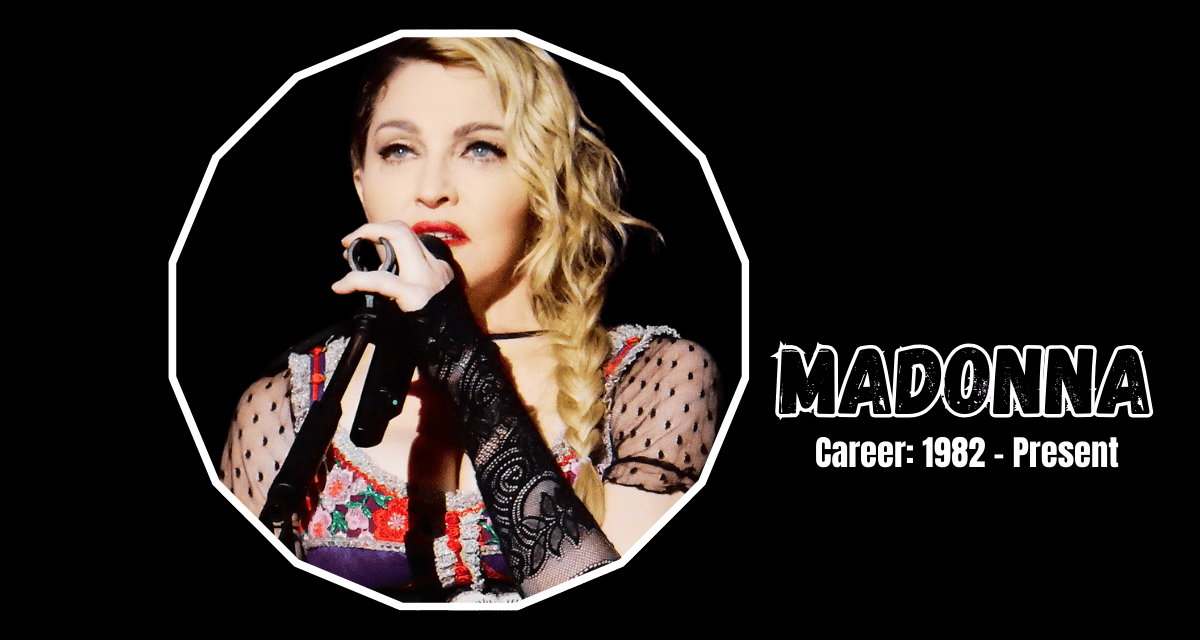Quick Facts About Madonna
• Birth: August 16, 1958, Bay City, Michigan, USA
• Career: 1982 – Present
• Genres: Pop, dance, electronic
• Notable Albums: Like a Virgin, True Blue, Like a Prayer, Ray of Light, Confessions on a Dance Floor
• Awards: 7 Grammy Awards, Rock and Roll Hall of Fame Induction (2008), Billboard Woman of the Year (2016)
Early Life and Background
Madonna Louise Ciccone was born on August 16, 1958, in Bay City, Michigan. She was the third of six children in a Catholic family. Her father, Silvio Ciccone, was a Chrysler and General Motors engineer, while her mother, Madonna Fortin, was a homemaker. After her mother passed away from breast cancer when Madonna was just five years old, her father remarried, creating a challenging family dynamic that influenced her later work.
From a young age, Madonna showed a strong passion for dance and performing arts. She took ballet lessons and was heavily involved in her high school’s drama productions. After graduating from high school, she moved to New York City in 1978 to pursue a dance career, armed with only $35 and a fierce determination to succeed.
Rise to Fame
Madonna’s journey in New York began with odd jobs, including waiting tables and dancing in various nightclubs. She quickly made a name for herself in the dance scene, which led to opportunities as a backup dancer for established artists. In 1982, she released her debut single, “Everybody,” which became a dance club hit and marked the beginning of her ascent to stardom.
In 1983, Madonna released her self-titled debut album, which included hits like “Holiday” and “Lucky Star.” The album’s success propelled her into the limelight, and she became an influential figure in the music industry. Her unique style, combining pop, dance, and provocative imagery, set her apart from her contemporaries.
Breakthrough Albums and Iconic Hits
Madonna’s second album, Like a Virgin (1984), solidified her status as a pop icon. The title track became her first number-one hit on the Billboard Hot 100 and showcased her ability to blend catchy melodies with bold, controversial themes. The accompanying music video, featuring Madonna in a wedding dress, sparked discussions about sexuality and femininity, which became a hallmark of her career.
Throughout the 1980s, Madonna released a string of successful albums, including True Blue (1986), which featured hits like “Live to Tell” and “Papa Don’t Preach.” Her third studio album, Like a Prayer (1989), marked a significant artistic evolution. The title track and its accompanying video, which included religious imagery, faced criticism from various groups but ultimately reinforced her reputation as a boundary-pushing artist.
Reinventing Pop Culture
One of Madonna’s defining characteristics is her ability to reinvent herself. Each album and era brought a new persona, whether it was the sultry, provocative figure of the Erotica era or the spiritual and reflective tone of Ray of Light (1998). This constant evolution kept her relevant in an ever-changing music landscape and allowed her to explore different musical genres, from pop to dance to electronic.
In the 1990s, Madonna embraced her role as a cultural provocateur. The release of the album Erotica (1992) and the controversial coffee table book Sex pushed the boundaries of sexuality in mainstream media. Despite the backlash, these projects demonstrated her fearlessness and commitment to her artistic vision.
Success and Legacy
Madonna’s influence extended beyond music. She became a fashion icon, known for her distinctive style and daring fashion choices. Her collaborations with designers like Jean-Paul Gaultier and her ability to set trends helped shape the fashion landscape of the 1980s and 1990s.
In the 2000s, Madonna continued to dominate the charts with albums like Music (2000) and Confessions on a Dance Floor (2005). The latter featured hits like “Hung Up,” which showcased her ability to blend contemporary sounds with her classic pop sensibilities. She also made headlines for her innovative use of technology in music and performances, including her iconic Super Bowl halftime show in 2012.
Madonna’s Net Worth
As of 2024, Madonna’s net worth is estimated to be around $850 million. This substantial wealth is largely attributed to her successful music career, which includes record sales and lucrative concert tours. Notably, her “Sticky & Sweet Tour” from 2008-09 remains her highest-grossing tour, earning approximately $407.7 million.
Madonna continues to influence the music industry and has expanded her career into various ventures, including acting. Her ongoing projects and performances contribute significantly to her financial success.
Advocacy and Philanthropy
Beyond her musical accomplishments, Madonna is known for her activism and philanthropy. She has been a vocal advocate for LGBTQ+ rights, women’s rights and various social justice causes. In 1991, she co-founded the charity Raising Malawi, which focuses on supporting orphaned children in Malawi, a cause that has become deeply personal to her.
Madonna’s commitment to social issues has also influenced her music. Songs like “Express Yourself” and “Justify My Love” challenged societal norms and encouraged listeners to embrace their individuality. Her impact extends beyond entertainment, as she has used her platform to inspire change and promote awareness of critical issues.
Awards and Recognition
Throughout her career, Madonna has received numerous awards and accolades, solidifying her status as the “Queen of Pop.” She has won multiple Grammy Awards, American Music Awards, and Billboard Music Awards. In 2008, she was inducted into the Rock and Roll Hall of Fame, recognizing her contributions to music and pop culture.
Madonna’s influence has also been acknowledged by various organizations. In 2016, she was honored with the Billboard Woman of the Year award, celebrating her achievements and impact on the music industry. Her ability to push boundaries and challenge conventions has earned her a place as one of the most iconic figures in popular culture.
Conclusion
Madonna’s impact on music, culture, and society is unparalleled. As a pioneer of pop music, she has redefined what it means to be a female artist in the industry. Her ability to reinvent herself and push boundaries has inspired countless artists and fans. Madonna’s legacy as the “Queen of Pop” is secure, and her contributions to music and culture will continue to resonate for generations.





